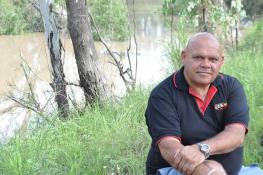
Vale Tiga Bayles
Australia’s most prominent and awarded First Nations broadcaster, Tiga Bayles, has passed away.
Bayles, a Birri Gubba Gungalu man and a Dawson River Murri, died on 17 April 2016, aged 62, after a long battle with cancer.
CBAA Chief Executive Officer Jon Bisset commented on the loss of this prominent sector leader:
“Tiga’s focus on giving a voice to Indigenous Australians brought him in to the world of community broadcasting and for that we are very grateful. The importance of his contributions over the last three decades cannot be overstated. While he will be greatly missed, his legacy will remain and be remembered for many years to come. Our thoughts are with Tiga’s family and friends.”
Tiga was most recently the Chief Executive Officer of the Brisbane Indigenous Media Association’s 98.9FM radio station.
He passed away peacefully at his Brisbane home, surrounded by family and friends. Details for the funeral of Tiga Bayles, which will be held in Brisbane, will be announced soon.
The Brisbane Indigenous Media Association has kindly shared the following, which details Tiga's life and many of his achievements:
Tiga was born Harold James Phillip Bayles on 6th October 1953. He was raised in Theodore in Central Queensland, and lived in Redfern, Dubbo, Coonamble and later Brisbane.
He was a leading figure in the Aboriginal rights movement, and played a key role in the 1982 Brisbane Commonwealth Games protests, and protests at the Bicentennial celebrations in Sydney in 1988.
Tiga was an early chairman of the NSW Aboriginal Land Council, and named Queensland Father of the Year in 2005. He raised nine girls, and was Australia’s most prominent – and awarded – First Nations broadcaster.
Among his many honours, Tiga was the inaugural winner of the national Deadly Award for Indigenous Broadcaster of the Year, and his work around decolonisation and invasion was recognised by Amnesty International’s inaugural media awards in 2014.
Tiga served on numerous boards, including the National Indigenous Radio Service, a community-controlled organisation he helped found. He was also the Asia Pacific representative of the World Association of Community Radio Broadcasting, a role that saw him travel the world advocating for First Nations’ media.
Tiga was deeply involved in the renowned Murri School in Brisbane’s Acacia Ridge, and served as its Chairman for many years, a role he held until his passing.
He got his start in the music industry touring the country as a band manager with Murri Jama. Shortly after, Tiga helped to establish Radio Redfern in Sydney with his mother, Maureen Watson. Tiga eventually moved back to Brisbane, and helped establish the Brisbane Indigenous Media Association, and the National Indigenous Radio Service. BIMA – the home of 98.9FM - is one of the nation’s most popular and successful community radio stations. Tiga’s morning program, Let’s Talk, was broadcast five days a week around the nation via the National Indigenous Radio Service network.
Tiga's family, under the guidance of his uncle Ross Watson, created BIMA. Tiga took the reigns when Ross retired, and oversaw its expansion to become a nationally recognised training organisation for First Nations people working in the media. More than a thousand First Nations people have been trained in broadcasting through BIMA, via an innovative school-based traineeship program. Tiga led the move of 98.9FM to a state of the art multi-media centre in West End in 2011, securing the future of First Nations media for generations to come.
Tributes to Tiga continue to flow:
Farewell to #Tiga Bayles a great Indigenous leader, broadcaster and fraternal colleague - joined us yrs ago for Beds Are Burning filming!
— Peter Garrett (@pgarrett) April 17, 2016
Sad passing of a warrior Tiga Bayles Our work in SEQ owes much 2 your strength & wisdom. Condolences 2 Bayles family pic.twitter.com/gRBuobImMO
— Deadly Choices (@DeadlyChoices) April 17, 2016
Indigeous Affairs Minister Nigel Scullion pays tribute to Tiga Bayles #RIP pic.twitter.com/cQuWKT0KYo
— Marie McInerney (@mariemcinerney) April 18, 2016
Facebook comments